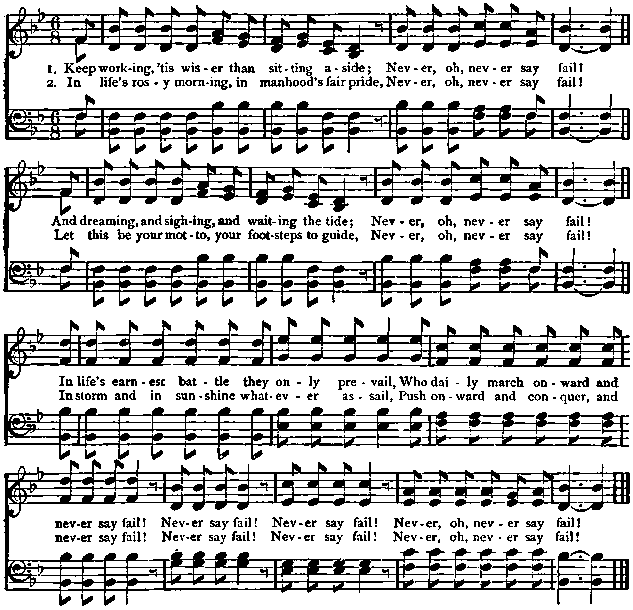Franklin Square Song Collection - online songbook
200 favorite songs and Hymns for Schools, Homes Lyrics & Sheet Music
| Share page | Visit Us On FB |
|
l6o FRANKLIN-SQUARE SONG COLLECTION. |
|||
|
Military Music.—The origin of military music takes us back to remote antiquity. Every nation in ancient times had its peculiar instruments of music, and its national songs. These songs invariably refer to victories gained, battles fought, sieges carried on, or the services of some individual hero. The name of the soldier or officer who had done some deed of renown stood beside that of the general who commanded. With the Spartans, the song Castor was the signal for combat; the Romans took cities to the sound of the trumpet and the horn; the Egyptians, Arabians and ancient Germans went to battle to the beating of drums, the sound of the flute, the cymbal |
and the clarion. In ancient times and among different people, each instrument had its peculiar use. The Chinese, in their war music, employed bells and triangles. With the Romans, the trumpet indicated the assembling of the troops, the bugle announced the coming of the general, and the horn gave the signal of retreat. It was to the noise of these instruments combined—discordant, shrill, deafening—that they threw themselves upon the ranks of the enemy. Among the Egyptians, bells, in conjunction with timbrels, served to form a species of military harmony. The Hebrew soldiery employed the horn, the trumpet, the timbrel and the sackbut, an instrument some- |
||
|
NEVER SAY FAIL. |
School-Day Singer. |
||
 |
|||
|
|
|||
|
what resembling the trombone. The music attached to the Roman legions had made much progress at the time of the conquest of the Gauls; but dating from this epoch, it became more and more feeble. The soldiery of France received and preserved the clarion and trumpet of Caesar's armies, but the custom of making use of music was insensibly lost. At the commencement of the Middle Ages, the instruments handed down and preserved were useful merely in rallying the soldiers, calling them to battle, and making them endure with gayety the fatigues of a march. At this time, the method of the Romans had entirely disappeared. About this period, the French min- |
strels began occasionally to accompany the troops to battle. Their instruments were the rebec, a little three-stringed violin, bagpipe, and flute or pipe. About the year 1330, they began to use the clarion, an instrument derived from the Moors, who transmitted it into Portugal from Africa. The cornet, another war instrument of the ancients, made its reappearance about the same time. It was about this time, also, that the adventurous Italian bands recovered the usage of military music, which soon spread among the other nations of Europe. To the drums and trumpets they joined the flute, fife and pandean pipe The drum was played with a single stick.—Moore. |
||